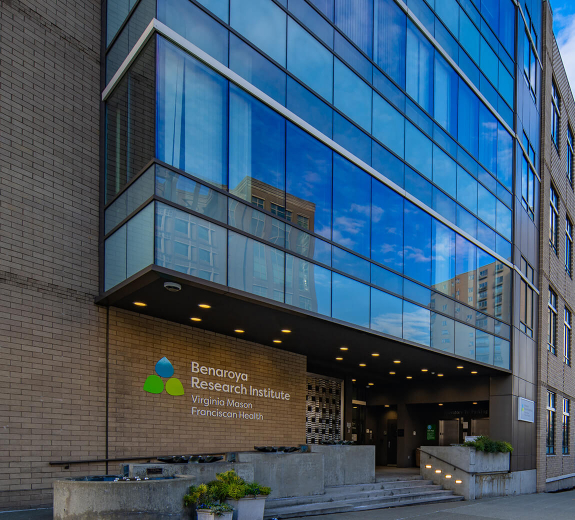Benaroya Research Institute at Virginia Mason (BRI) recently received a grant to research how blocking a particular molecule in metastatic breast cancer reduces both the growth of primary tumors and the number of lung metastases. BRI scientists have found in models of the disease that blocking this protein can shrink tumors by 60 - 80 percent and can keep the tumor from metastasizing or spreading to the lung. The $1.8 million five-year grant comes from the National Cancer Institute of the National Institutes of Health.
“We are excited to pursue this area of cancer research that links tumor growth to the type of immune system molecules that my laboratory has focused on for many years,” said the Principal Investigator of the grant, Steven F. Ziegler, PhD, Director of the Immunology Program at BRI. “We are looking at ways to block this protein in model systems that could be translated to humans. The goal of this work is to help develop a therapy to reduce primary breast cancer tumors, as well as the spread of this cancer to other areas. We also plan to study this in pancreatic and lung cancer as well because this protein plays a role in these diseases.”
In a study of the protein, Thymic Stromal Lymphopoietin (TSLP), in allergic responses Dr. Ziegler and his team used lung cancer as a “negative control group” and surprisingly found very high levels of the protein in people with lung tumors. In 2005, Dr. Ziegler and his colleagues discovered that TSLP was instrumental in initiating the inflammatory cascade that leads to the development of asthma and other allergic diseases. Since then, the researchers also found TSLP to be critical in other immune system diseases. Dr. Ziegler has studied TSLP since 1993 and has developed many tools and strategies for studying the protein.
BRI researchers will test several ways to block TSLP to evaluate potential for treatments to help eliminate the cancer. “We will assess the utility of measuring TSLP to inform prognosis and how this might indicate whether more specific treatment plans may be necessary in some cases,” said Dr. Ziegler. His team also will be studying the protein versican that has been shown to turn on TSLP in tumor metastasis. Thomas Wight, PhD, BRI Director of the Matrix Biology Program, and a leading researcher of versican, will be a collaborator on the grant along with Scott Adams, PhD, Professor of Oncology, Department of Immunology at Roswell Park Cancer Institute. Emma Kuan, PhD, a postdoctoral fellow in Dr. Ziegler’s laboratory, is a major contributor and researcher on the grant.



